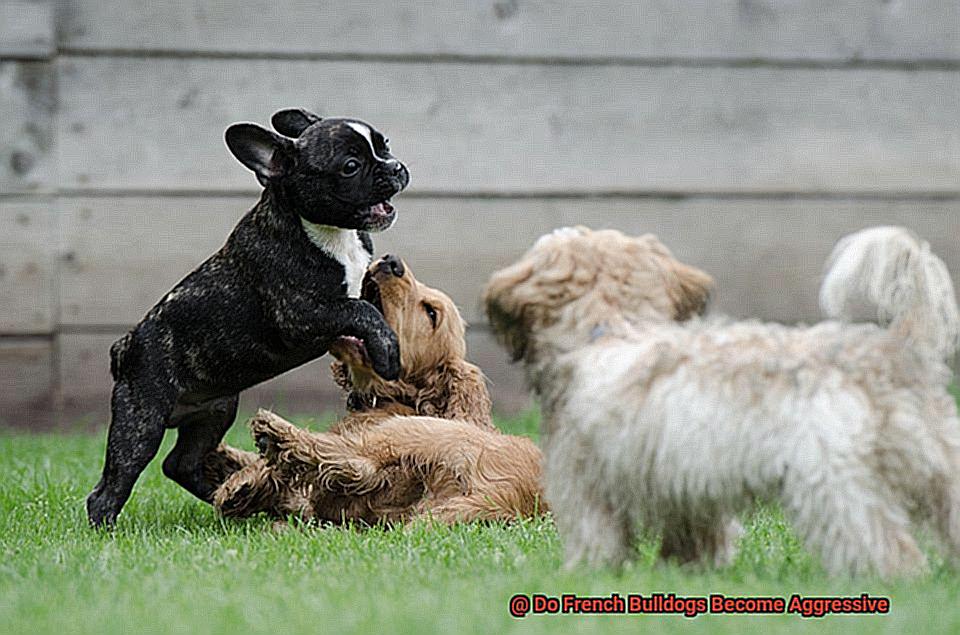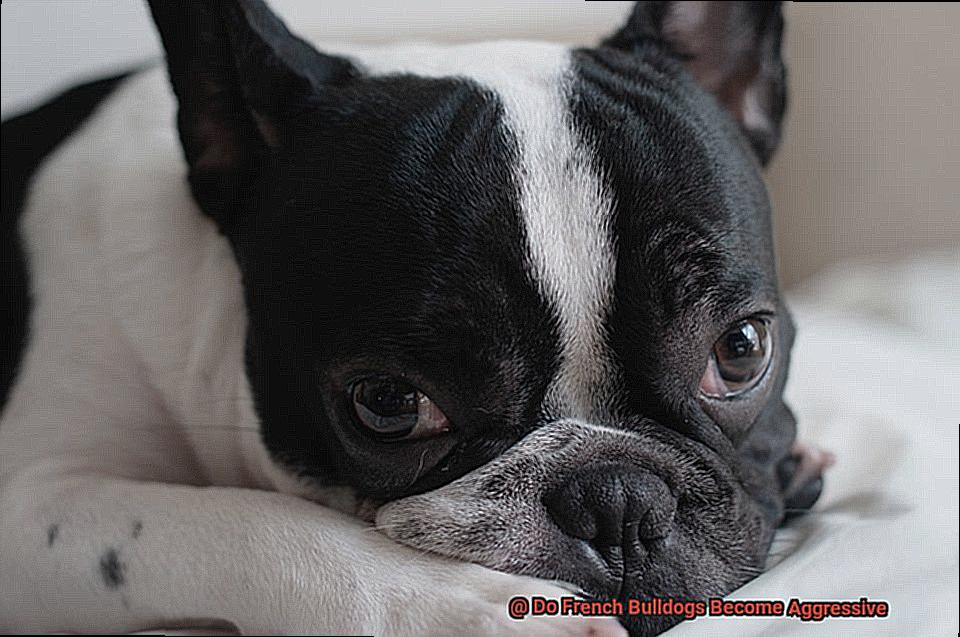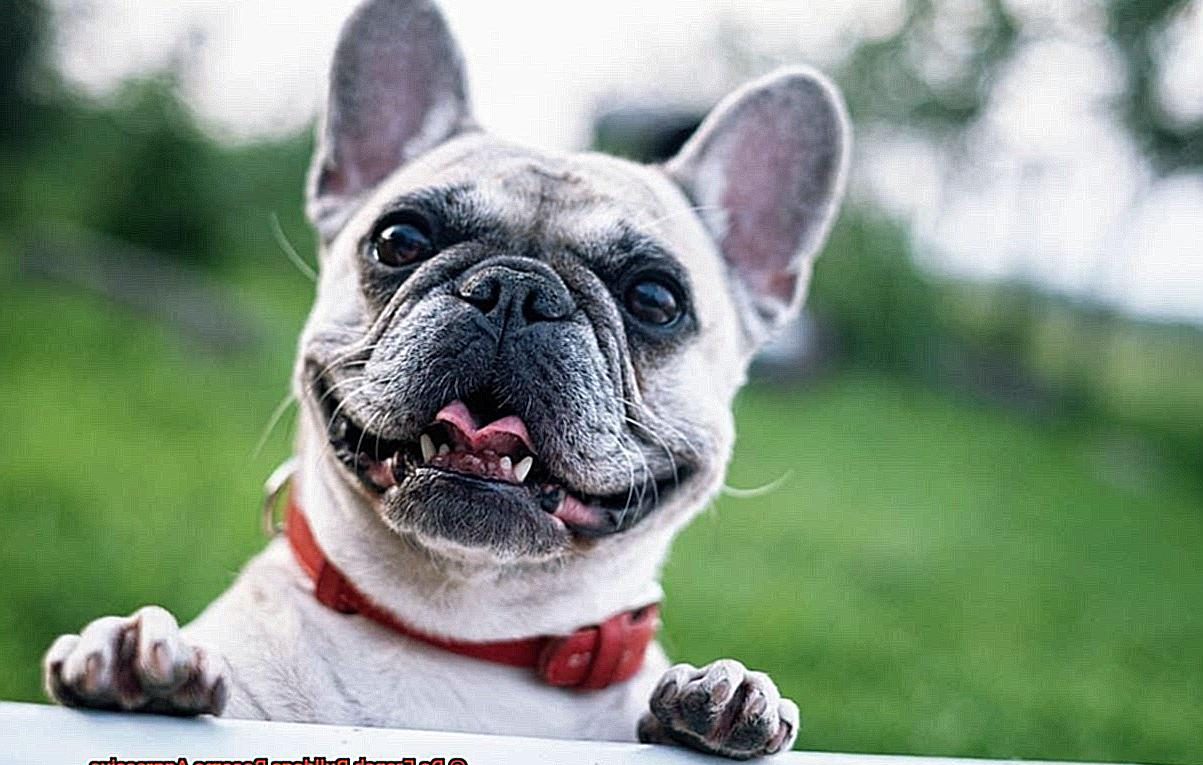Do French Bulldogs Become Aggressive?
French bulldogs, with their irresistible charm and playful antics, have captured the hearts of dog lovers around the globe. These little bundles of joy are known for their affectionate nature and friendly demeanor, making them perfect companions. However, there’s a lingering question that often sparks heated debates among dog enthusiasts—do French bulldogs become aggressive?
In this blog post, we’re going to dive headfirst into the subject of French bulldog aggression, aiming to debunk myths and provide you with a comprehensive understanding of this breed’s temperament. We’ll explore both the everyday factors that can trigger aggression in Frenchies, as well as insights from professionals who have studied their behavior.
It’s important to approach this topic with an open mind and leave behind any preconceived notions or stereotypes. While it’s true that any dog has the potential for aggression under certain circumstances, we must remember that each case is unique and should be evaluated individually.
So join us on this enlightening journey as we unravel the complexities surrounding French bulldog aggression. We’ll equip you with knowledge about potential triggers, effective management techniques, and the reality of this behavior. By separating fact from fiction, you’ll gain a deeper understanding of these charismatic dogs and ensure a harmonious and safe companionship experience for everyone involved – whether you’re already a proud Frenchie owner or considering adding one to your family.
Let’s put an end to the speculation and get to the bottom of whether French bulldogs truly become aggressive. The truth awaits.
How Does Genetics Impact Aggression in French Bulldogs?
Contents
- 1 How Does Genetics Impact Aggression in French Bulldogs?
- 2 The Importance of Socialization for French Bulldogs
- 3 Training Techniques to Reduce Aggression in French Bulldogs
- 4 Health Issues That Can Lead to Aggression in French Bulldogs
- 5 Signs of Aggressive Behavior in French Bulldogs
- 6 How to Address Signs of Aggression in French Bulldogs
- 7 Tips on Preventing Aggression in French Bulldogs
- 8 Common Misconceptions About the Temperament of French Bulldogs
- 9 Conclusion
French Bulldogs are renowned for their friendly and affectionate nature, but like any other breed, they can sometimes display aggression. As a responsible owner, it’s crucial to understand the role genetics play in shaping your French Bulldog’s behavior. In this blog post, we will delve into the impact of genetics on aggression in French Bulldogs, offering valuable insights and practical tips to ensure the well-being of your furry friend.
Genetic Predisposition:
Just like humans inherit certain traits from their parents, French Bulldogs can also inherit genetic predispositions that influence their propensity for aggression. These predispositions are linked to genes associated with temperament, social behavior, and fearfulness. However, it’s important to remember that not all French Bulldogs will exhibit aggression, as individual variations within the breed are common.
Breeding Practices:
Responsible breeders play a crucial role in minimizing aggression in French Bulldogs. They carefully select breeding pairs with stable and friendly personalities, prioritizing temperament over appearance. By considering the temperament of both parents, breeders can reduce the risk of producing puppies with aggressive tendencies.
Inbreeding and Genetic Disorders:
In some cases, aggressive behavior in French Bulldogs can be traced back to genetic disorders resulting from inbreeding or poor breeding practices. Inbreeding increases the likelihood of negative traits being passed down through generations, including aggression. Reputable breeders avoid inbreeding and prioritize genetic diversity to reduce the risk of behavioral problems.
Environmental Factors:

While genetics are a significant factor, it’s important to acknowledge that environmental factors also contribute to a French Bulldog’s behavior and aggression. Early socialization, positive training methods, exposure to different stimuli, and overall upbringing can either promote or suppress aggressive tendencies. Providing a loving and supportive environment is key to nurturing a well-rounded and non-aggressive French Bulldog.
Identifying Aggressive Traits:
Recognizing potential signs of aggression in your French Bulldog is crucial for early intervention and management. Some common signs include growling, snapping, biting, lunging, or displaying dominant behaviors. It’s important to understand that not all forms of aggression are the same and can be influenced by different underlying factors.
Addressing Aggression:
If you notice signs of aggression in your French Bulldog, seeking professional help from a veterinarian or animal behaviorist is imperative. They can assess the situation and provide guidance on behavior modification techniques, training strategies, and environmental modifications to manage and reduce aggression.
Conclusion:
Genetics play a significant role in determining the temperament and behavior of French Bulldogs, including their propensity for aggression. By understanding the impact of genetics on aggression and implementing responsible breeding practices, early socialization, and positive training methods, owners can create a safe and harmonious environment for their beloved French Bulldogs. Remember, a well-rounded and non-aggressive French Bulldog is a happy companion for life.
The Importance of Socialization for French Bulldogs
French Bulldogs are adorable, affectionate, and full of personality. But did you know that early socialization is crucial for these lovable pups? Socialization refers to the process of exposing a dog to various people, animals, environments, and situations in a positive and controlled manner. It helps them develop into well-rounded and confident dogs. Let’s dive into why socialization is so important for French Bulldogs and how it can help them thrive.
- Prevents Aggressive Behavior: Just like any other dog breed, French Bulldogs require socialization to prevent aggressive behavior. Without proper socialization, they may become fearful or anxious, leading to defensive or aggressive behavior. By exposing them to new experiences from an early age, we can help them learn how to interact appropriately with humans, other dogs, and different environments.
- Builds Confidence: Early socialization helps French Bulldogs build confidence. When they are exposed to new people, animals, and environments in a positive way, they learn that the world is a safe and exciting place. This confidence translates into well-adjusted dogs who are not easily intimidated or reactive in unfamiliar situations.
- Teaches Proper Social Skills: Socialization allows French Bulldogs to learn proper social skills. By introducing them to different people, including children, adults, strangers, and individuals from different ethnicities, we help them become comfortable with various human interactions. This ensures that they are friendly and well-behaved in social settings.
- Avoids Fear-Based Aggression: Environmental socialization is also important for French Bulldogs. Exposing them to different sounds, sights, smells, and locations can help prevent fear-based aggression triggered by unfamiliar stimuli. By gradually introducing them to new environments and stimuli in a controlled manner, we can help them overcome their fears and develop a more relaxed and confident demeanor.
- Continued Socialization: Socialization should not stop after the puppy stage. Ongoing socialization throughout a French Bulldog’s life is important to reinforce positive behavior and prevent regression. Doggy daycare, obedience classes, and playdates with other well-socialized dogs are excellent opportunities for continued socialization.
Remember, patience and consistency are key during the socialization process. Rushing or forcing a fearful or anxious French Bulldog into new situations can worsen their behavior. Seek the guidance of a professional dog trainer or behaviorist if needed.
Training Techniques to Reduce Aggression in French Bulldogs
French Bulldogs are known for their playful and affectionate nature, but like any other breed, they can display aggressive behavior if not properly trained and socialized. Early intervention and consistent training are crucial in reducing aggression and ensuring a well-behaved French Bulldog. In this section, we will explore effective training techniques to help curb aggression in your furry friend.
Positive Reinforcement: The Power of Rewards
When it comes to training a French Bulldog, positive reinforcement is key. This training technique focuses on rewarding desired behaviors rather than punishing unwanted ones. Use treats, praise, or playtime as rewards when your French Bulldog displays calm and non-aggressive behavior. This approach not only strengthens the bond between you and your furry friend but also encourages them to repeat those desirable actions.
Consistency and Repetition: The Path to Success
Consistency is vital when training a French Bulldog to reduce aggression. Establish clear boundaries and rules, and ensure that all family members follow them consistently. Repetition is also important to reinforce the desired behaviors. Keep training sessions short but frequent to maintain your French Bulldog’s attention and engagement.
Socialization: Building Confidence and Reducing Aggression
Socialization plays a crucial role in reducing aggression in French Bulldogs. Introduce your furry friend to various environments, people, and other animals from a young age. Gradually expose them to new experiences, ensuring positive interactions and rewarding calm behavior. This helps them become well-rounded dogs who are less prone to aggressive tendencies.
Obedience Training: Establishing Hierarchy
Teaching basic obedience commands such as sit, stay, and come is essential for French Bulldogs to understand and follow instructions. This establishes a clear hierarchy within the household and helps prevent aggressive behavior stemming from dominance issues.
Desensitization Techniques: Overcoming Triggers
If your French Bulldog displays aggression towards specific stimuli, desensitization techniques can be helpful. Gradually expose them to the triggers that elicit their aggressive response while rewarding calm behavior. This process helps them overcome their fears or triggers and reduces the likelihood of aggressive outbursts.
Seek Professional Help: When in Doubt
If you’re struggling to manage your French Bulldog’s aggressive behavior, don’t hesitate to seek professional help. A dog trainer or behaviorist who specializes in aggression issues can provide valuable guidance and tailored training techniques for your specific situation.
Health Issues That Can Lead to Aggression in French Bulldogs
French Bulldogs are typically known for their friendly and sociable nature. However, aggression can sometimes arise in these beloved pets. In this expert analysis, we will explore the health issues that can contribute to aggression in French Bulldogs, shedding light on the underlying causes and highlighting the importance of proper veterinary care.
Brachycephalic Syndrome:
- French Bulldogs are prone to Brachycephalic Syndrome, a condition characterized by anatomical abnormalities in the respiratory system.
- The syndrome can lead to breathing difficulties, causing discomfort and frustration that may manifest as aggressive behaviors.
Chronic Pain:
- French Bulldogs are susceptible to various orthopedic conditions like hip dysplasia or intervertebral disc disease.
- Ongoing pain from these conditions can make a dog irritable, leading to aggression as a defense mechanism.

Hypothyroidism:
- Hypothyroidism is a hormonal imbalance where the thyroid gland doesn’t produce enough hormones.
- This condition can cause mood swings and increased aggression in French Bulldogs.
Neurological Disorders:
- Epilepsy and brain tumors are neurological disorders that can affect brain activity and cognitive functions.
- These conditions may result in unpredictable behaviors, including aggression.
Managing Aggression in French Bulldogs:
- Regular check-ups and veterinary care are crucial for identifying and addressing potential health issues that contribute to aggression.
- Treatment options may include medication, surgery, physical therapy, or specialized management strategies tailored to the specific condition.
- It’s important to remember that aggression should never be dismissed as a mere behavioral problem; comprehensive veterinary evaluation is essential.
Signs of Aggressive Behavior in French Bulldogs
French Bulldogs, with their adorable wrinkled faces and playful personalities, are known for their friendly and affectionate nature. However, like any other breed, they can exhibit signs of aggression that need to be recognized and addressed. As an expert on this subject, I will guide you through the signs of aggressive behavior in French Bulldogs, helping you understand when intervention is necessary.
Growling and Snapping:
One of the most common signs of aggression in French Bulldogs is growling and snapping. When your Frenchie starts vocalizing their displeasure or threatens to bite, it’s crucial to take immediate action.
Biting:
Aggressive biting behavior is a clear sign that your French Bulldog needs help. Whether it’s directed towards humans or other animals, addressing this behavior promptly is essential to prevent future incidents.
Lunging and Barking:
French Bulldogs may display aggression by lunging and barking excessively. This behavior can be intimidating and dangerous, especially if directed towards strangers or other pets. It’s important to address this behavior promptly before it escalates.
Stiff Body Posture:
Aggressive French Bulldogs often exhibit a stiff body posture, with their tail held high and ears forward. This shows they are on high alert and ready to defend themselves or attack if necessary.
Raised Hackles:
When a French Bulldog becomes aggressive, you may notice its hackles, the hair along its back, standing up. This physical response indicates heightened arousal and aggression.
Resource Guarding:
Some French Bulldogs may display aggression when it comes to protecting their resources, such as food, toys, or even their favorite spot on the couch. Growling, snapping, or biting may occur if someone tries to approach or take away their possessions.
Dominance Behavior:
Aggressive French Bulldogs may exhibit dominant behaviors like mounting other dogs or humans, attempting to assert their dominance over others in their surroundings.
Fear Aggression:
Fear can trigger aggressive behavior in French Bulldogs. If your dog feels threatened or scared, it may react aggressively as a defense mechanism.
Remember, not all aggressive behavior displayed by a French Bulldog is inherently dangerous or indicative of deeply aggressive tendencies. However, it’s crucial to address and manage any signs of aggression to ensure a safe and harmonious environment for both your dog and those around them.
How to Address Signs of Aggression in French Bulldogs
French Bulldogs are known for their friendly and loving nature, but just like any other dog breed, they can display signs of aggression. It is important for owners to be able to recognize and address these signs to ensure the safety of both the dog and those around them. In this blog post, we will explore common signs of aggression in French Bulldogs and provide practical tips on how to address them effectively.
Signs of Aggression in French Bulldogs:
- Growling or snarling: One common sign of aggression in French Bulldogs is growling or snarling. This behavior often occurs when they feel threatened or uncomfortable in a particular situation. It is important to pay attention to these vocalizations and take appropriate action.
- Snapping or biting: Another sign to watch out for is snapping or biting. This can happen when a French Bulldog feels cornered or believes its personal space is being invaded. It is crucial to avoid putting your dog in situations where they feel the need to lunge or snap, and provide proper training and socialization.
Addressing Signs of Aggression:
- Consult with a veterinarian: The first step in addressing aggression is to consult with a veterinarian to rule out any underlying medical issues that could be causing or contributing to the behavior. They can provide guidance on how to manage aggression effectively.
- Seek professional help: Professional dog trainers or behaviorists specialized in aggression can provide valuable guidance and help create an appropriate behavior modification plan for your French Bulldog. They have the expertise to identify the root cause of aggression and develop a tailored approach.
- Socialization is key: Socialization plays a crucial role in preventing and managing aggression in French Bulldogs. Exposing your dog to various people, animals, and environments from an early age can help them feel more comfortable and reduce the likelihood of aggressive behavior.
- Positive reinforcement training: Use positive reinforcement training techniques to encourage desired behavior and discourage aggressive tendencies. Reward your Frenchie with treats and praise when they display good behavior, and avoid punishment-based methods that can worsen aggression.
- Consistency is vital: Establish clear rules and boundaries for your French Bulldog, and ensure that everyone who interacts with them follows them consistently. Consistency helps your dog understand what is expected of them and builds trust between you and your Frenchie.
Tips on Preventing Aggression in French Bulldogs
French Bulldogs are adorable and affectionate companions, but just like any dog breed, they can display aggression if not properly trained and socialized. In this article, we will explore some tips on how to prevent aggression in French Bulldogs, ensuring a happy and harmonious relationship between you and your furry friend.
Socialize Your French Bulldog:
Early socialization is key to preventing aggression in French Bulldogs. Introduce them to different people, animals, and environments from a young age. Take them for walks, visit dog parks, and arrange playdates with other well-behaved dogs. This helps them become confident and comfortable in various situations.
Positive Reinforcement Training:
Train your French Bulldog using positive reinforcement techniques. Reward good behavior with treats, praise, or a favorite toy. This motivates them to repeat those behaviors and discourages aggressive tendencies. Avoid punishment-based training methods that can escalate aggression.
Provide Mental and Physical Stimulation:
Keep your French Bulldog mentally and physically stimulated to prevent boredom-induced aggression. Engage them in regular exercise, such as daily walks or playtime at the park. Use puzzle toys or interactive games to challenge their minds and channel their energy in a positive way.
Establish Consistency:
Establish a routine for feeding, exercise, and training to make your French Bulldog feel secure and understand what is expected of them. Consistency helps reduce stress levels, which can contribute to aggressive behavior.
Seek Professional Help if Needed:
If you are struggling with aggression issues that cannot be resolved through basic training and socialization, seek professional help from a dog trainer or behaviorist. They can provide expert guidance tailored to your specific situation.
Common Misconceptions About the Temperament of French Bulldogs
French Bulldogs, often misunderstood due to their appearance, are actually known for their friendly and affectionate nature. It’s time to debunk the myths and set the record straight about the temperament of these lovable pooches.
Misconception 1: French Bulldogs are aggressive dogs.
Contrary to popular belief, French Bulldogs are not aggressive by nature. Their muscular build and strong jaw may give off a fierce impression, but looks can be deceiving. French Bulldogs are friendly and sociable animals that thrive on human companionship. They are often referred to as “people dogs” because of their love for human interaction.
Misconception 2: French Bulldogs are not good with children.
On the contrary, French Bulldogs are patient and tolerant, making them an excellent choice for families with young kids. They have a natural affinity for children and can form strong bonds with them. However, it’s important to supervise interactions between dogs and children to ensure the safety of both parties.
Misconception 3: French Bulldogs are difficult to train and stubborn.
While it’s true that they can have a stubborn streak at times, French Bulldogs are generally eager to please their owners. With consistent training methods based on positive reinforcement, they can learn new commands and tricks. Patience and perseverance will go a long way in bringing out the best in these intelligent pups.
Misconception 4: French Bulldogs have a high prey drive.
While some individuals may exhibit a higher prey drive, many French Bulldogs can peacefully coexist with other animals if properly socialized from a young age. Early exposure to different environments, people, and animals will help shape their behavior positively.
It’s important to remember that every dog is an individual, and factors such as genetics, environment, socialization, and training play a significant role in shaping their behavior. It’s unfair to generalize the temperament of an entire breed based on a few isolated incidents or misconceptions.
Conclusion
In conclusion, it is important to understand that French bulldogs, like any other breed, have the potential to display aggression. However, it is crucial to note that aggression in French bulldogs is not a common trait and should not be generalized. With proper training, socialization, and care from responsible owners, French bulldogs can grow up to be friendly and well-behaved companions.
It is essential to remember that aggression in dogs can stem from various factors such as genetics, upbringing, and environment. While some French bulldogs may exhibit signs of aggression due to fear or anxiety, it does not mean that all French bulldogs are inherently aggressive.
To prevent aggression in French bulldogs, early socialization is key. Exposing them to different people, animals, and environments from a young age helps them develop positive associations and reduces the likelihood of fearful or aggressive behavior later on.
Additionally, consistent training using positive reinforcement techniques can help establish clear boundaries and reinforce desirable behaviors. This approach encourages trust and cooperation between the dog and its owner while minimizing the chances of aggressive tendencies.
Proper care also plays a significant role in preventing aggression. Meeting their physical and mental needs through regular exercise, mental stimulation, and a balanced diet can contribute to their overall well-being and reduce the likelihood of behavioral issues.
In summary, while there may be instances where French bulldogs display aggression, it is not a characteristic trait of the breed.




